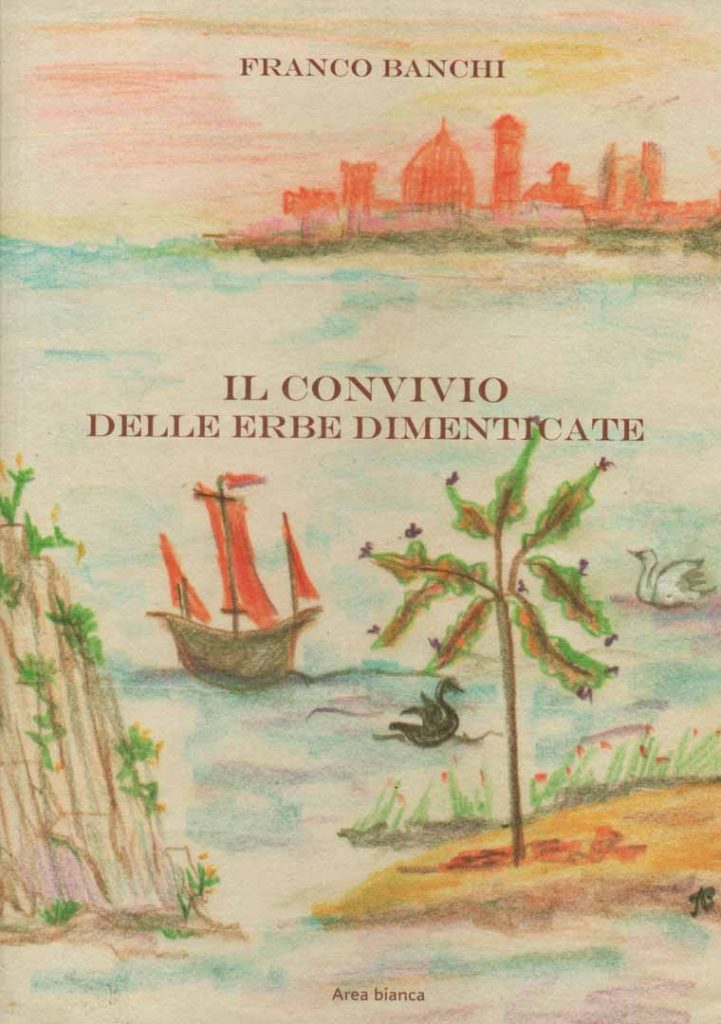Preface 2023
Preface – magazine 2023 A contemporary magazine feeds upon dynamism and vigour. It instantly perceives the inputs deriving from the readers and evolves, offering its best at...
Preface – magazine 2023 A contemporary magazine feeds upon dynamism and vigour. It instantly perceives the inputs deriving from the readers and evolves, offering its best at...
Every morning, on time, a few moments before dawn, which, in that region, smelled of thousands of woods, Sumio, who everyone in the village knew as “the Japanese”,...
In recent months, South Korea has risen against Beijing’s want to associate the pao cai speciality with its most representative and identifying gastronomic recipe based on...
The plague described by Manzoni arrived in Milan in the autumn of 1629, spreading gradually in 1630. In May of the same year, everything fell apart, so much so that people...
An interview with Alberto Tintori of OSCAR TINTORI VIVAI By Fiamma Domestici I have always nourished an unconditional passion for the noble citrus fruits of the Tuscan tradition,...
The Westernization of Japan: the Meiji Renewal With the expression Meiji Renewal (明治 維新), we indicate the radical change in the political, economic and social structure of Japan,...
4A Liceo scientifico (astronomico) – Gobetti-Volta, Bagno a Ripoli (Firenze)* The universe that revolves around food and Renaissance banquets has always had a link with the...
During the classic lunch breaks at the office, dinners with friends or Sunday brunches, how many times do we happen to think about the technology associated with the meal we are...
The subtleties of nature and health One of the most significant female figures of the early Middle Ages, Hildegard, lived along the Rhine River, in the tract that separates Hesse...
“Autumn. We already heard it coming / in the August wind, / in the September rains / torrential and weeping…”, this is how Vincenzo Cardarelli sang this...
“Let him bring huge lampreys or enormous salmons or pike, without letting it be known. A good eel is hardly bad, shad or tench or some good sturgeon, cakes or stuffed...
Every morning, on time, a few moments before dawn, which, in that region, smelled of thousands of woods, Sumio, who everyone in the village knew as “the Japanese”, used to buy some whole bread and cheese from the pantry of the inn. After that, he would climb on the heights, following the same torrent but always along different paths. He remained in the mountain’s company until its variegated inhabitants, on a whim, gradually darkened his way back.

In the small town by the lake, where war resumed after too many winters, seizing the most beautiful youth – but not hope -, the arrival of the tiny Japanese scholar created a scandal. The rumour was that he was an enemy spy, escaped, no one knows how with forged papers from a defeated Japan. Furthermore, why beat inch by inch and secretly study the lands between the white stream and the Croda Della Regina mountain? He was most likely a saboteur.
The mistrust towards the little Japanese scholar lasted many weeks. Nevertheless, the rules of hospitality, essential for all the inhabitants of the valley, never ceased, beginning with the owner of the Locanda del Gambero (the Shrimp’s Inn). Day after day, he appreciated more and more the politeness, courtesy and “refinement” – these were his own words – of the modest and only guest.
Every evening, after dinner, a handful of village elders gathered in front of the fireplace. They transformed the inn into a tavern. First to play cards, then drink, amid ancient songs and less and less rare laughter, sipping the renowned distillate the whole area envied to the host.
The only one to remain on the sidelines was the little Japanese, who took notes, drew and, for the particular kindness of the host, sipped tea on repeat, folded in his sadness.
One evening, after the customary card game followed by the opening of a bigger than usual bottle of grappa, the elderly gathered in a circle as in meditation. After a prolonged pause of silence, the eldest began to speak solemnly, skilfully capturing the attention of all the audience.
The innkeeper approached Sumio. For the first time, he saw his surprise and interest in what was happening around him. In a low and quiet voice, he said, “this is the evening of the stories and tales of the mountain. They talk about the crayfish”.
The little Japanese understood less than what the host had hoped, but the word crayfish gave him a start. He almost yelled and stood up, repeating, “yes, crayfish!”
The elder who was speaking froze, staring at the guest for a long time. Then he broke into a smile and asked, “Do you understand crayfish?”. Sumio, approaching the circle of the elderly, could not help but repeat with transport, “Yes, yes, yes”.
The elderly continued, “sit down with us. Listen carefully to the story of how crayfish changed the history of our village over years and centuries”.
The narrator went back in time to describe the beauty of the white stream, the purest and most transparent of all the Alps. Its waters made it possible at all times to see perfectly even the deepest pebbles lying on its bottom, iridescent like the rainbow, where crayfish hid in all their beauty, with their precious armour that changed according to the season. To catch them after a swim, it was a party. It was a blessing to see them multiply, indifferent to the aims of the young fishermen of the village. Those were the times of poverty, but also times of peace between men and nature, with the Croda della Regina protecting everyone, young and old, with her reassuring shape.
Sumio, although unable to understand his words, was enraptured by the tone of the elderly narrator’s voice and his gestures. A prisoner of the magic of his silence, he took the opportunity to draw with his imagination the contours of an extraordinary story of fresh water and crayfish. It was taking shape in front of him during an already chilly autumn night. “Now that season is over”, the elder exclaimed, changing his tone and mood. “Since that cursed day when the invaders got water from the White Stream, the current has become opaque and brown. They poisoned our life, and the crayfish are gone. For us, the war is not over yet. We will come back more, as in the past, to spend our Sundays on the banks of the White Stream, singing to the sun and love.”
Meanwhile, tears filled the eyes of the little Japanese, who, in his heart, had well understood, among the few words he effectively knew, the connection between war and crayfish.
Then Sumio stood up just as the elderly village parish priest, who could not miss the usual vigil of stories and tales, entered the inn. He began to speak in ancient Japanese, looking into the eyes of every interlocutor with an intensity worth more than any translation. Using his inseparable notebook, full of notes and above all, of drawings, Sumio came to caress the imagination of those old childish hearts and deeply touched everyone’s soul, creating the most beautiful story ever told under the Croda della Regina.
The only words that the elders, the host and the parish priest understood were Japan, world war, Hiroshima, defeat, and crayfish. Now, thanks to the drawings, beautiful watercolours in which Sumio had represented crayfish from Japan, everyone understood the purpose of his mysterious studies. The last page of his sketchpad stopped in 1941 when Japan entered the war. Now, observing with amazement the routes drawn from the village to the source, alongside the old crayfish settlement areas, everyone thanked heaven for the arrival of an “enemy” who had turned into a friend.
For some weeks, the little Japanese researcher barely returned to the inn, always later and later, he dined and went directly to sleep. At the evening vigils, they began to miss his presence. Nevertheless, none of the elders, not even the innkeeper, dared to bother him.
One evening, before going to bed, Sumio left a note to the innkeeper, making it clear that he had to give it to the elders. Tomorrow, at dawn, village children with me Croda Regina. It was the approximate but eloquent note.
The message effectively reached its destination. The villagers discussed this request for a long time, but the final decision was unanimous.
When the sun had not yet risen completely, the five children of the village were already inside the inn having breakfast with Sumio and the innkeeper, who, for the occasion, had prepared something special.
Then they left, singing a cheerful Japanese melody following the delicate voice of the researcher.
At the end of the afternoon, when the sun of that incredible day had begun to tire, the five children, at breakneck speed, arrived in the tiny town square, excited and cheering. The first, the youngest of all, had a wicker basket in his hands, which he held as a precious casket. On the sidelines, the child opened it. He showed it to the eldest of the village who had waited for their return all day. Raising the lid, he caressed his nephew and wept with happiness.
The village bells rang for a long time until the elderly parish priest was exhausted.
The crayfish were back, and the war finally ended, thanks to a small Japanese researcher, once perhaps an enemy, never a man of war.
He never went back to the village. At the First Feast of the Return, where La Croda della Regina gives birth to the White Stream, the innkeeper of the Gambero Inn felt his presence next to him. He was cooking for everyone, following the recipe that Sumio had left him with the Great Book, that very night with no return when no child in the village had been able to sleep.

The recipe was river pearls.
Ingredients: a shell, symbol of pilgrimage, an egg, a metaphor for rebirth and perfection, and crayfish as a model of sublime lightness. Add to parsley, lemon, salt, pepper and oil. Hard-boil one egg for each couple of diners. Meanwhile, sear some peeled crayfish in boiling salted water. Drain, let them cool and cut into small pieces. Marinade them in a bowl with chopped parsley, pepper, salt and lemon juice. Mix thoroughly. Using a scallop for each guest, lay in chopped shrimp and half an egg with the yolk facing down. Sprinkle with salt, pepper and parsley. Add a few drops of olive oil.